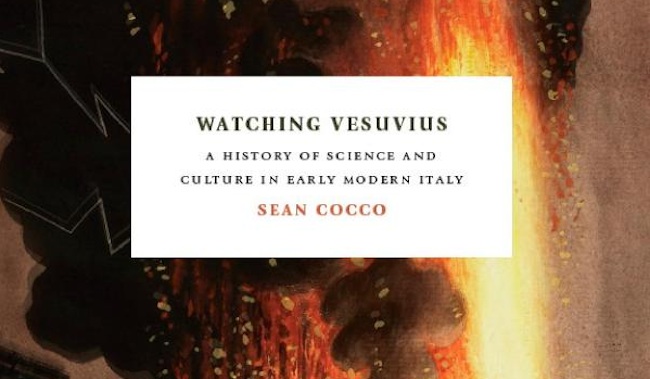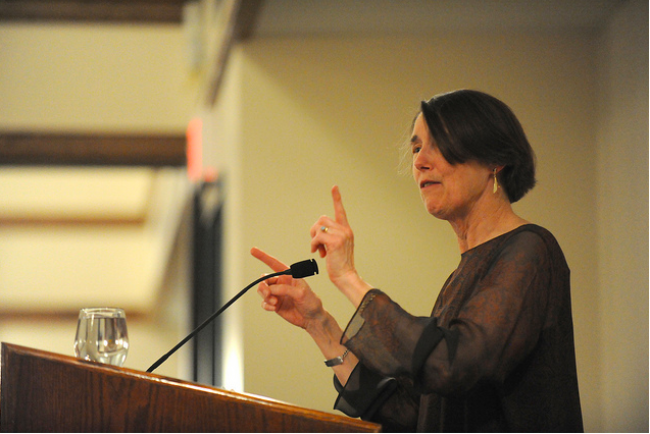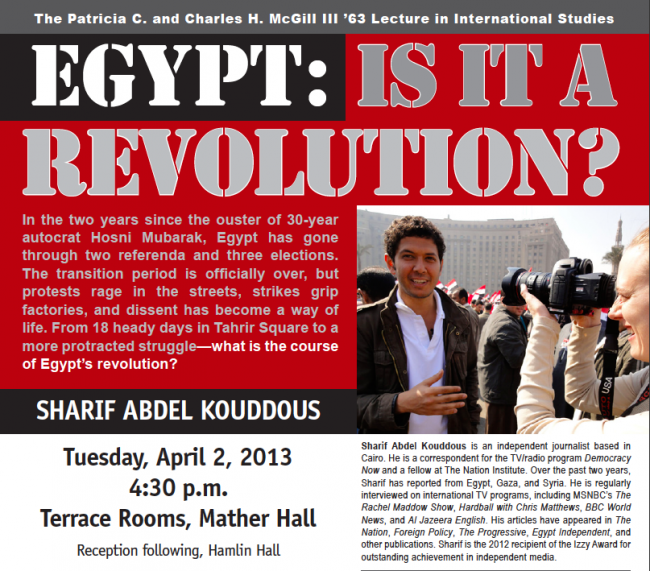Senior Thesis 2013 Presentations

On Thursday, May 2nd,four history senior thesis writers presented their research findings to the department. Also in attendance were retired distinguished history professors Painter and Chatfield. The presentations were moderated by Michael Lestz, Chair, and Prof. Cocco, faculty thesis supervisor.
In order of appearance:
(more…)
The Frailty of Historical Truth: Learning Why Historians Inevitably Err
 By David Lowenthal “How tiresome are the endless anecdotes about [William Best] Hesseltine, his seminar, and his students,” wrote Wisconsin editor Paul Hass.1 Yet the unsung historiographical lessons that seminar imparted to me and others richly merit recording. By scanning our mentors’ publications in skeptical depth, students learned that hidden bias always skews evidence, that secondary sources are ipso facto unreliable, and that myriad minor errors betoken major sins. Still more, they learned that even paragons do not have enough time, patience, or probity to prevent all such lapses and avoid their egregious epistemic consequences. Historians ever stumble on feet of clay. How tiresome are the endless anecdotes about [William Best] Hesseltine, his seminar, and his students,” wrote Wisconsin editor Paul Hass.1 Yet the unsung historiographical lessons that seminar imparted to me and others richly merit recording. By scanning our mentors’ publications in skeptical depth, students learned that hidden bias always skews evidence, that secondary sources are ipso facto unreliable, and that myriad minor errors betoken major sins. Still more, they learned that even paragons do not have enough time, patience, or probity to prevent all such lapses and avoid their egregious epistemic consequences. Historians ever stumble on feet of clay. At the University of Wisconsin from 1932 until his death in 1963, Hesseltine was a renowned chronicler of the Civil War and its aftermath, whose “commandments” on historical writing are still often cited. His anathemas forbade the passive voice, the present tense, designating persons by their last names only, and quoting from secondary sources. He inveighed against the rising tide of pompous impedimenta: “do not discuss thy methodology”; “write about thy subject and not about the documents concerning thy subject”; “fight all thy battles in the footnotes.” And––pertinent in today’s Wiedergutmachung spate of apology, tempting historians to turn moralist—”thou shalt not pass judgments on mankind in general nor … pardon anyone for anything.” 2 A retrospective celebrant prized Hesseltine’s “strange blend of pacifism, anarchism, Menckenism, Calvinism, and sheer naked perversity.”3”
By David Lowenthal “How tiresome are the endless anecdotes about [William Best] Hesseltine, his seminar, and his students,” wrote Wisconsin editor Paul Hass.1 Yet the unsung historiographical lessons that seminar imparted to me and others richly merit recording. By scanning our mentors’ publications in skeptical depth, students learned that hidden bias always skews evidence, that secondary sources are ipso facto unreliable, and that myriad minor errors betoken major sins. Still more, they learned that even paragons do not have enough time, patience, or probity to prevent all such lapses and avoid their egregious epistemic consequences. Historians ever stumble on feet of clay. How tiresome are the endless anecdotes about [William Best] Hesseltine, his seminar, and his students,” wrote Wisconsin editor Paul Hass.1 Yet the unsung historiographical lessons that seminar imparted to me and others richly merit recording. By scanning our mentors’ publications in skeptical depth, students learned that hidden bias always skews evidence, that secondary sources are ipso facto unreliable, and that myriad minor errors betoken major sins. Still more, they learned that even paragons do not have enough time, patience, or probity to prevent all such lapses and avoid their egregious epistemic consequences. Historians ever stumble on feet of clay. At the University of Wisconsin from 1932 until his death in 1963, Hesseltine was a renowned chronicler of the Civil War and its aftermath, whose “commandments” on historical writing are still often cited. His anathemas forbade the passive voice, the present tense, designating persons by their last names only, and quoting from secondary sources. He inveighed against the rising tide of pompous impedimenta: “do not discuss thy methodology”; “write about thy subject and not about the documents concerning thy subject”; “fight all thy battles in the footnotes.” And––pertinent in today’s Wiedergutmachung spate of apology, tempting historians to turn moralist—”thou shalt not pass judgments on mankind in general nor … pardon anyone for anything.” 2 A retrospective celebrant prized Hesseltine’s “strange blend of pacifism, anarchism, Menckenism, Calvinism, and sheer naked perversity.”3”
[From The Art of History column in the March 2013 issue of Perspectives on History]
Prof. Cocco Discusses New Book

In March, Prof. Sean Cocco of the History Dept. gave an audio recorded interview for New Books in Science, Technology, and Society (NBSTS), which aims for a broadly interdisciplinary coverage of recently-published books in science studies.
According the website: “The story starts on a high-speed train and ends with six men in a crater, with hundreds of years and a number of explosions in between. Sean Cocco’s rich new book uses Vesuvius as a focal point for exploring the histories of natural history, travel, observation, imaging, astronomy, and many other aspects of the places and identities of early modern history. Watching Vesuvius: A History of Science and Culture in Early Modern Italy (University of Chicago Press, 2013) pays special attention to the many resonances of emplacement and locality, and to the agency of the Vesuvinan landscape, as it explores the continuities and transformations in the seventeenth and eighteenth century volcanic landscape. Volcanology emerged along with Neapolitan identity while volcanoes became emblematic of the south in the writings of European travelers: rumbling, unpredictable, given to heated eruptions. Cocco’s account shows us the beauty of these transformations as they were embodied in paintings, poems, letters, and other media. Scholars and enthusiasts of the urban and political history of Europe will find much of interest here, as will readers interested in the history of vernacular understandings of nature.”
Listen to the interview HERE.
Post Grad Internship Opportunity: Match Educatoin

If you are graduating senior with a History Major and interested in pursuing a career in education, the History Dept. urges students to consider this internship opportunity with Match Education. The Match Corps and its sister program, Match Teacher Residency, are ideal for individuals interested in taking a gap year or in transitioning into a career in education. Basically, top-notch college grads serve as tutors and mentors in our schools for one year, and have the option to participate in intense, hands-on teacher training during this residency year.
(more…)
The McGill Lecture: Egypt: is it A Revolution?
HARTFORD, CT, April 4, 2013 – “The 18 heady days of rebellion in Cairo’s Tahrir Square in January 2011 were filled with hope, promise and the expectation of a better life. But the events of the past two years have not unfolded as envisioned by the tens of thousands of Egyptians who took part in the Tahrir Square demonstrations that led to the ouster of longtime President Hosni Mubarak. Sharif Abdel Kouddous delivers the annual Patricia C. and Charles H. McGill III ’63 Lecture in International Studies. Those were among the major conclusions drawn by Sharif Abdel Kouddous, an independent Cairo-based journalist, who on Tuesday delivered the annual Patricia C. and Charles H. McGill III ’63 Lecture in International Studies in Mather Hall. Kouddous’ lecture was entitled, “Egypt: Is it a Revolution?” The overthrow of Mubarak, an autocrat who had been in power for three decades, was among the first of several uprisings in the Middle East that came to be known as the Arab Spring, and were thought to be the beginnings of democracy taking root in countries where dictatorships had long flourished. Indeed, in the immediate aftermath of Mubarak’s ouster, “foreigners would smile and congratulate me,” said Kouddous. “Today I get a much different reaction – a look of pity. People ask me, ‘What happened?’ Is the revolution over?’ What are the prospects fos for change?’”
The Mill Faculty Lecture Series: Hip Hop and Zambian Rock-n-Roll
By: Colin Greaney (History Major, Class of 2013. [In April, Prof. Markle delivered a lecture for The Mill Faculty Lecture Series, a new student-led initiative that provides a space for Trinity faculty to share their research and scholarship]
 “The study of hip-hop in academia requires thoughtful consideration of the African diaspora, a largely coerced diffusion of Africans via the trans-Atlantic slave trade. Uniting the various forms and expressions of hip-hop from the Americas, Caribbean, and Europe is the sense of connection, real or imagined, to Africa. Many black artists will speak of “going home” in a spiritual sense, since they – and many generations prior – may never have been to the continent. Out of this academic lens, two other areas are worth consideration. First, scholars who eschew the study of hip-hop cite that the discussion relies too heavily on the character of the Master of Ceremony (MC), and the lyric contents he or she includes. The delivery of lines, the underlying musical influences, and the self-aware approach are all neglected to some degree. This problem was born in part by the music industry’s premium on the economic viability of producing music.”
“The study of hip-hop in academia requires thoughtful consideration of the African diaspora, a largely coerced diffusion of Africans via the trans-Atlantic slave trade. Uniting the various forms and expressions of hip-hop from the Americas, Caribbean, and Europe is the sense of connection, real or imagined, to Africa. Many black artists will speak of “going home” in a spiritual sense, since they – and many generations prior – may never have been to the continent. Out of this academic lens, two other areas are worth consideration. First, scholars who eschew the study of hip-hop cite that the discussion relies too heavily on the character of the Master of Ceremony (MC), and the lyric contents he or she includes. The delivery of lines, the underlying musical influences, and the self-aware approach are all neglected to some degree. This problem was born in part by the music industry’s premium on the economic viability of producing music.”
(more…)
Prof. Antrim’s “Mapping the Middle East” featured on the Watkinson Library’s Blog

Originally posted on The Bibliophilie’s Lair: The serendipitous discovery of COOL STUFF in the Watkinson
“Several days ago we hosted professor Zayde Antrim’s “Mapping the Middle East” class. The students pick a historical atlas and answer a questionnaire about aspects of what they see. Here is the course description: “This course approaches the history of the Middle East through maps. It will look at the many different ways maps have told the story of the territory we now call the Middle East and the many different points of view that have defined it as a geographical entity. Readings will analyze maps as social constructions and will place mapmaking and map-use in a historical context. We will relate maps to questions of empire, colonialism, war and peace, nationalism, and environmental change.””
Check out The Bibliophile’s Lair HERE.
At Trinity and around the world: Pulitzer Winner Joan Hedrick
 By Serena Elavia ’14 for The Trinity Tripod
By Serena Elavia ’14 for The Trinity Tripod
“Not every university can boast about having a Pulitzer Prize winning author, but Trinity can. Over winter vacation, the Charles A. Dana Professor of History Joan Hedrick was featured in a three part PBS special called “The Abolitionists.” The special was a docudrama, meaning that it was part documentary and part historical reenactment. Given that Hedrick wrote a Pulitzer Prize winning biography of Stowe, she is a go to source of information on Stowe and was chosen for the PBS special and Hedrick happily accepted the offer. “Stowe was so influential in the debate on slavery and to be represented in a series on abolition was important for me to do,” says Hedrick on why she accepted the offer to be interviewed in the series. Hedrick’s interviews were featured in the second episode, which focused on Stowe, of the three part series. Hedrick describes the process of filming as “very good.” The director, producer and writer of the series Rob Rapley was an “excellent interviewer” according to Hedrick. She says that it was helpful to work with someone very skilled and low key and that the overall interviewing process went well. Before the special aired on Tuesday Jan. 8, the Harriet Beecher Stowe Center in Hartford, Conn. held a panel discussion featuring Hedrick and other professors at Connecticut universities. Many do not know that Stowe spent her retirement in Hartford. The Center has converted Stowe’s home into a museum that offers educational programs and has a library that includes many letters that Stowe wrote to her husband Calvin Ellis Stowe.”



